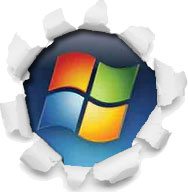
Why an ERP Solution Might Not be Right for Your
Enterprise
White Paper
Business Situation:
How re-architecting existing business databases may be the best path to
proper Enterprise data management.
This paper explores the myth that a big, expensive ERP system is better than
multiple department level databases built in Microsoft Access or another
off-the-shelf database tool. It is understood that the big, expensive ERP system
should have many intrinsic advantages over multiple databases. It should provide
a common infrastructure, a unified set of database tables that store all of the
enterprise’s data, dedicated product support, training and more. This document
will suggest an alternative to the big, expensive ERP system approach. We posit
that taking your disparate departmental databases and having them professionally
re-written into one seamless, integrated system that is specifically purpose
built for your enterprise cannot only be accomplished at a lower cost but
provide better value.
The core of this problem is ERP companies that exaggerate the faults of multiple
department level databases while failing to point out common sense alternatives
that do not benefit them, but would greatly benefit your enterprise.
Next we would like to debunk some major industry myths.
#1. Microsoft Access is a toy, in order to store and report on data your
Enterprise you cannot possibly use Microsoft Access, you must use Crystal
Reports, Coreview or some other expensive Enterprise class reporting tool.
Yeah right. We build some of the most complex reports, train office knowledge
workers on how to build their own reports and design complex Enterprise
databases on a daily basis. Guess what one of our primary tools is? Microsoft
Access. As with most marketing hype, it is based on some fact. The fact is that
Microsoft Access by itself is insufficient for large numbers of users as a data
storage system. That is why several years ago Microsoft introduced, Microsoft
SQL server. This product eliminates the short comings of Microsoft Access while
complimenting its strengths. By replacing the basic data storage system that
comes with Access with the much more robust Microsoft SQL server, you can still
use Access as an easy and powerful reporting tool. SQL server offers tremendous
scalability. Extremely large systems such as dell.com and nasdaq.com are based
on Microsoft SQL server. If your enterprise greatly exceeds these in size you
may stop reading this document and proceed on with your plan to buy a bigger
solution, it is a good thing your budget matches the size of your enterprise,
you’ll need it. Now for the rest of the business world, Microsoft offers an
affordable, powerful and easy solution. In fact you may already own it! You may
just need some help leveraging the Microsoft systems you already own. That’s
where WSI comes in but we’ll tell you more about that later.
#2. If your company is currently using an Access database or some other type of
internally developed database solution for day to day operations, and you're
outgrowing it, you must buy a big, expensive ERP system.
Wrong, you have options. Now it is possible that after exploring these options
you may still select the big, expensive ERP system. However, our intent is that
you fully explore another alternative.
First, let's acknowledge all the things that truly are wrong with most database
driven solutions. You may have many different departments, each having their own
database that completely fails to take into account other departments in the
same enterprise. Second, these databases may still be running on a foundation
that was developed years ago. Third, you may now have more users or data than
the system will adequately support. Don’t despair, you have options. Buying a
big, expensive ERP system is an option. The risk is fairly high, despite what
the ERP sales person tells you many ERP implementations run grossly over budget
and miss their deadline. No solution is without stress, however we believe you
have a greater chance of success by re-architecting your existing databases and
moving them to a more powerful platform.
How do we do it?
WSI will provide you with a team of experienced database architects and
developers who have successfully re-engineered many business databases. This
team will assist you in determining your information goals, analyzing the
database/s you have in place today and showing you what it will take to reach
your information goals. This may be as simple as moving the tables that store
your data from Access (or another smaller database program) to Microsoft SQL
server. It may require a more comprehensive re-design of your enterprises data
plan including the elimination of redundant data being stored in multiple
departmental databases and much more. It has been our experience that this can
be accomplished for a fraction of the cost of most ERP implementations, with
much less stress on you and your Enterprise. This methodology insures that you
have a system that fits your business. It does not require you to conform your
business to an ERP system.
So remember, the system you have today may not be nearly as outmoded as some
sales person would have you believe. Access is not a toy! Because so many
enterprises insist on using Crystal Reports and other “enterprise reporting
tools” WSI works with these systems extensively. We haven’t seen a report yet,
that we could not build using Microsoft Access out of the hundreds we have built
using more expensive, more complicated tools. So if you have already bought the
big ERP system and it is time to get some useful information out of it, please
contact us, we can assist you with that. But for those who are considering
investing in an ERP system we encourage you to contact us for an assessment of
your data management needs and existing systems.